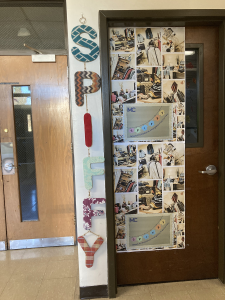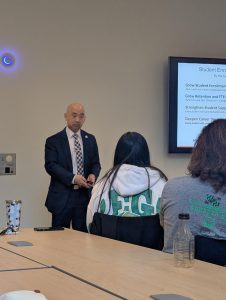We Are Our Own Enemy
October 5, 2016
In today’s day in age, it seems fairly easy to get into an argument with someone. Whether it be over civil liberties, racism, or foreign policy, it seems as if we cannot come to terms on anything.
The very world seen today is molded by one’s perceptions of reality. The world is governed by interpretations, perspectives, prejudice, etc. What is seen, what is taught, and what is encountered are all factors of in the shaping of a perspective.
Those who’ve lived in the states for more than a decade have probably become used to reciting the pledge of allegiance, many of whom ever thought to question it, or even take notice of how much it’s affected the way of thinking. It’s the little things that shape who someone is and what they do.
Take discrimination into hand. In some cases, say someone does not approve of another’s ethnicity, sexuality, or religion, he or she would be willing to not only classify that individual as inferior but would be willing to hurt and possibly kill that individual. It’s frightening for two reasons; one being that perceptions are prone to change, changing society and the environment in which it inhabits.
Change provokes uncertainty, and uncertainty provokes fear. Two, being the importance of perceptions. The paradigms, theories, and decisions made may seem like conclusions to years and years of studying and research, but who’s to say that it was interpreted correctly?
Perceptions are flawed from one’s lack of knowledge and understanding, causing one’s views to become distorted and complex; in fact, reality itself is far too complex for us to entirely comprehend. As explained by Charles W. Kegley Jr and Eugene Wittkopf, the complexity of human nature is approached in a unique sequence. This sequence allows individuals to make sense of the information taken in.
One could simplify this sequence into three terms; schematic reasoning, cognitive dissonance, and constructivism.
It begins with schematic reasoning, the way we process information. When interpreting new information, an individual subconsciously relate it to their memories, values, beliefs, etc. Kegley and Wittkopf would further add on that this leads one to accept or deny certain information because they can become, “incongruent with our prior beliefs.” Ironic thing is that you’re probably doing it right now, saying “What the heck is this guy talking about?”
Now you’re probably confused and skeptical on this topic, and you might be trying to decide whether you believe in this or not. If you don’t, that’s because psychological conflict that’s going on within your head is cognitive dissonance. This is what separates individuals and stimulates change into the individual’s lives. This is when we decide whether or not the information provided is acceptable or not.
This information will then be approached through constructivism. At this stage, in the light of the information learned—identities, institutions, paradigms, ideologies, theories, etc.—are formed. These three concepts are the factors in which make up civilizations and revolutions. Factors in which have defined the very soil walked on, the presidents elected, the people chosen to hate, and the image of the person looked at in the mirror every day. At the end of the day, the individual is their own enemy.












